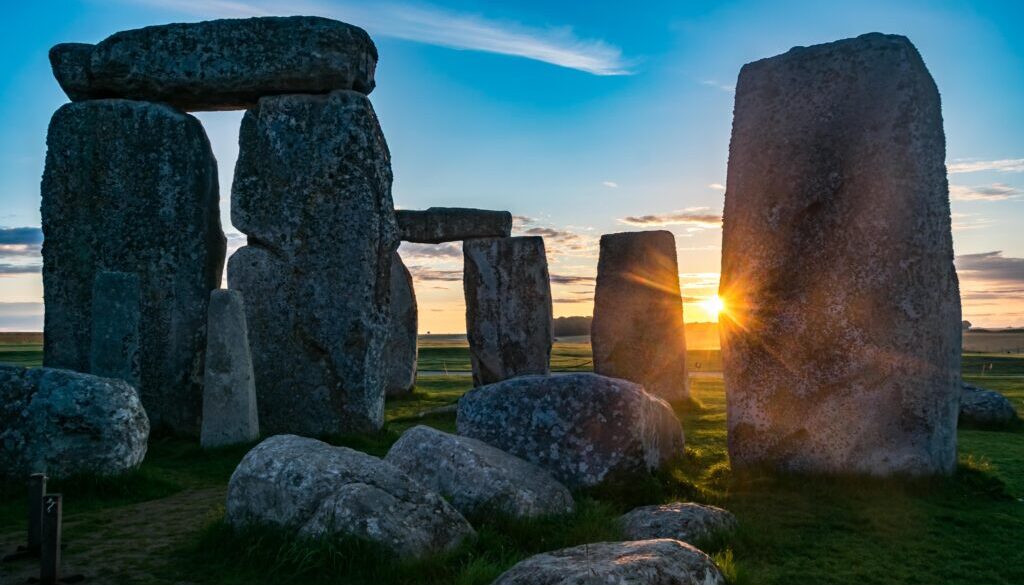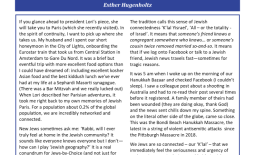The Fragments and the Whole
We had gotten up before dawn, driving out to Salisbury under the grey cover of the British December night.
Ordinarily, Stonehenge is open to the public as a tourist attraction, but twice a year, at the Winter and Summer Solstice, the ancient, mysterious structure reverts back to its original purpose: part astronomical observatory, part pagan temple. Pagans, Heathens, witches, wizards, Druids, yoga practitioners, nature lovers and others descend upon Stonehenge to hail the dawn.
The light was growing and glowing up by the time we got there, a tiny sliver of rose-colored light cracking the horizon. I stumbled over the dormant pillars when a Pagan practitioner politely scolded me in the most British way: ‘tread carefully, this is sacred ground.’ I fumbled an apology: I had certainly meant no disrespect—of course it was sacred ground.
Not long, those present took out timbrels and horns, some not too dissimilar from shofars, and sang and danced as the orb of the sun crowned above the horizon. The worshipers poured their collective energy into pulling the sun up, midwifing Time itself. It was an unexpectedly powerful and moving ceremony and our small group of Jews stood aside, silently and respectfully. I struck up a conversation with a nice young man. ‘What pantheon do you worship?’ I asked him with an open heart. ‘The Norse pantheon’, he responded. Then, in a brotherly gesture, he pulled out his bottle of homemade mead. ‘Would you like some?’ he asked innocently. ‘Has it been dedicated or consecrated to your gods?’ I replied gently. ‘Yes, it has. To Thor and Odin.’ I softly shook my head and explained as kindly as I could that it was proscribed in my faith to share his food and drink; that I have pledged fealty to my own God.
Every time I contemplate the concept of ‘idolatry’, this memory pops back up. I have Pagan and Heathen friends; I respect their spiritual orientation. While I cannot officially endorse their polytheism, nor can I bring myself to condemn it. If the One God I serve is petty enough to object to my fraternizing with polytheists, well, too bad. The sacred human relationship is my priority to honor.
The Book of Deuteronomy is filled with admonitions against what in Hebrew is called ‘avodah zarah’, ‘strange worship’, or idolatry. The prohibition on idolatry in Judaism may seem obscure by modern standards but it still informs Halakhah. For instance, I am careful not to bow or bend over when in the vicinity of a graven image, lest I am perceived to venerate it. One of the fiercest Halakhic discussions I’ve ever had in rabbinical school is that I argued against a stringent ruling of my teacher who said we could not eat the vegetarian food prepared by Hare Krishna devotees, because it is consecrated to Lord Krishna. It may be a feature of my personality, but I rolled my eyes and continued to happily eat in Hindu restaurants, under the watchful eyes of icons of Ganesh and Krishna.
It is tempting to roll our eyes, shrug our shoulders and consign the passages against idolatry to the dust heap of history. But we cannot wash our hands of these texts in Deuteronomy. When I attended a rabbinic conference in June near Salem, we visited the historic site of the witch trials where innocent Puritans were accused and sentenced to death under the guise of eradicating idolatry. Upon the flagstones of the memorial, their protestations of innocence had been carved for Eternity to witness. Invariably, one person’s insistent definition of idolatry ends in another person’s spilt blood.
Yet, this idea of idolatry sits with me. What does it mean? Why are some monotheists so keen on condemning the worship of multiple gods, or other sources of holy power? Isn’t it also a tad bit hypocritical, considering that every Biblical scholar worth their salt will identify the polytheist and monolatrist roots of our own monotheism? Just look at Psalm 29 which we sing every Shabbat: ‘Acclaim the Eternal, ‘b’nei Elim’, sons of gods?’ I rest my case.
This is all a red herring. I do not think we can ignore the prohibition on idolatry. We need to take accountability for why it is there, sometimes in all of its genocidal insanity. But we also must try to excavate the layers of complexity underlying it. Is it really about other gods? Does the God of Israel really care about Thor and Marduk, Athena and Osiris? For a religious culture that takes pride in believing in one God or less, I highly doubt it.
When I read Parashat Eikev, I read lush and contradictory passages. Lofty verses sing of the glory of our natural world, of the blessings of field and basket, of fruit and vine, milk and honey. Deuteronomy is a covenantal text; it is concerned with setting the terms and conditions of the Israelite national project between this people and its God. This last book of the Torah jealously guards the boundaries between Israelite and non-Israelite, between those who are faithful and who are not. This is where we find the clobber verses, the texts that make our skin crawl; that talk of the uprooting of other peoples, the pulling down of their idols; the destruction of their communities. They are deeply discomfiting texts.
Still, I glance hints that this speaks to a deeper truth; to a spiritual condition that is not found in the names of one’s gods or the offerings upon one’s altar.
Deuteronomy tells us that idolatry is a ‘snare’ (mokesh) to us. We are told to ‘not forget our God’ (pen tishkach et Adonai Eloheicha) lest our ‘hearts grow haughty’ when we advance into possession, prosperity and power. We are even told that when we uproot idolatry, we are not to take for ourselves the gold and silver as loot. In the Psalms and the Prophets, too, we are admonished time after time to not place our trust in graven images, which have ‘eyes that cannot see, ears that cannot hear’, lest we as their makers ‘become like them.’ What is this about?
We find ourselves now in the period of consolation, reading seven special Haftarot, after Tisha b’Av. This is a liminal space where we set our feet on the first steps towards the High Holidays. It is this Parashah that instructs us to circumcise our hearts; to reorient our priorities away from the temporal to the eternal; to turn away from possessions, prosperity and power to the Ultimate.
And I will admit, that when I read the lush, almost-paganistic reverence the Torah has for the earth in general and Eretz Yisrael in particular, I am struck that no ban on idolatry in our tradition is meant to dislodge the sanctity of life from our hearts. We all seek blessings on our fields, among the fruits ripening on the vine. In a climate change-impacted world, Deuteronomy seems to say: be thankful for what you have. Give thanks for the good earth, for the natural cycles and the daily miracles that sustain them. Do not let your eyes be lured by gold, or your hearts drawn away by fragments and figments of power. Do not exchange the whole for its parts, but rather, see the whole. Our fates are interconnected; we are all dependent on this delicate web of life. Allow the Oneness of all Being to unfurl in your soul as you chant the Sh’ma and gaze upon the images of the Webb Telescope, and at the cresting of the sun on a cold Solstice morning at Stonehenge, surrounded by fellow human beings who sense and revere the mystery and beauty of our universe.
Let this Deuteronomistic season not be one of condemnation but of curiosity, of an unfolding an integrating of our inner condition in response to the fracturing of our external circumstance. The Talmud remarks that each blade of grass has an angel encouraging it to grow. What wonder and how wonderful if we could see the world through the eyes of the Divine; loving and cherished; beautiful and fragile and oh so sacred. May this be our lodestar to the deepest connections we can know as human beings, and may we sanctify our world and ourselves just so.
Shabbat shalom.



